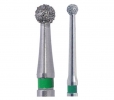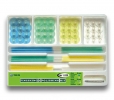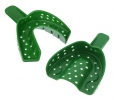The medium-long term success of osseointegrated dental implants is evaluated on the basis of the degree of osseointegration over time, assessed by radiographic or instrumental analysis (ISQ). Over the years, the question has always been which surgical technique can provide a better performance in the medium-long term and, thanks to literature studies, it has been evidenced that there are no differences between "one stage" and "two stage" interventions. The purpose of this study is to evaluate clinical and radiographic parameters, referring to interventions for the insertion of dental implants characterized by a new kind of implant surface (Synthegra® GEASS, Udine). The prospective study, not randomized and controlled, referred to the insertion of 18 implants on 9 patients with mono or bilateral edentulism, with measurements at 1, 3, 6 and 12 months and an overall follow-up at 3 years, in order to evaluate the different degree of crestal bone resorption using the submerged and transmucosal surgical technique. The results of our study show that there are no differences in the resorption of the two surgical techniques, with an average bone resorption of 2,05±0,16 mm, comparable with values reported in literature.
Source:24971162 PubMed PMCID: PMC4051271




